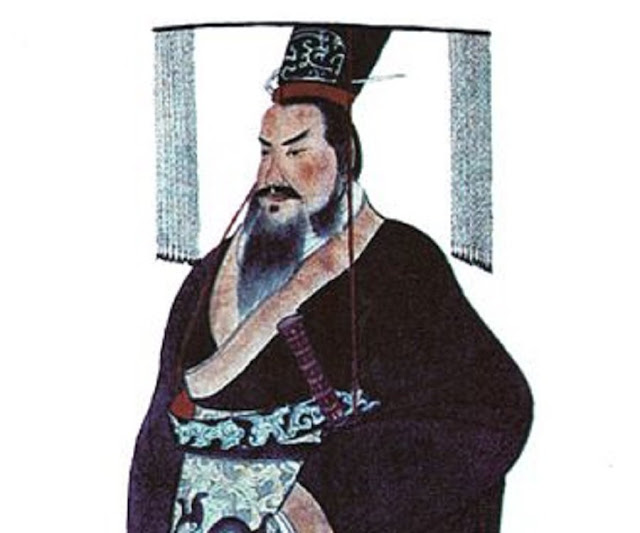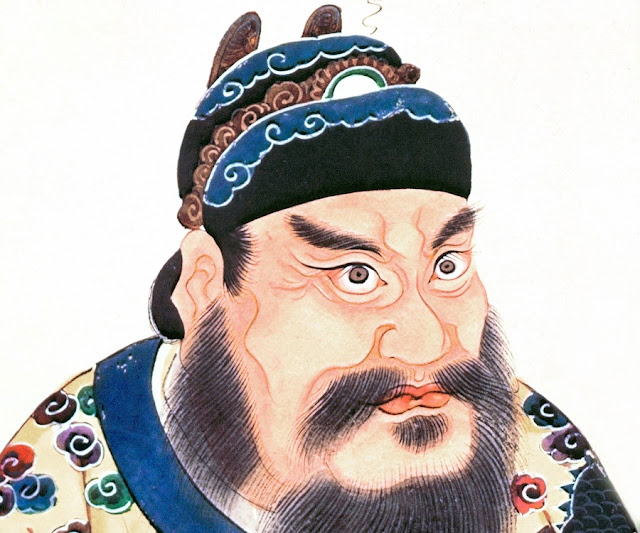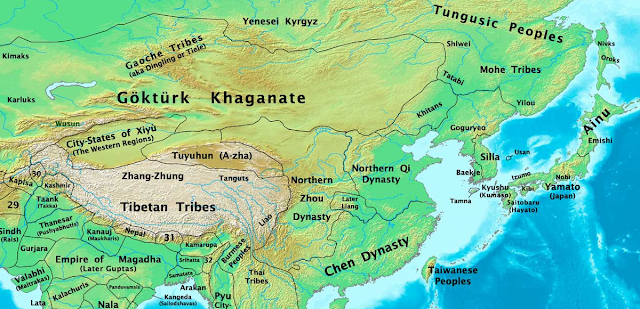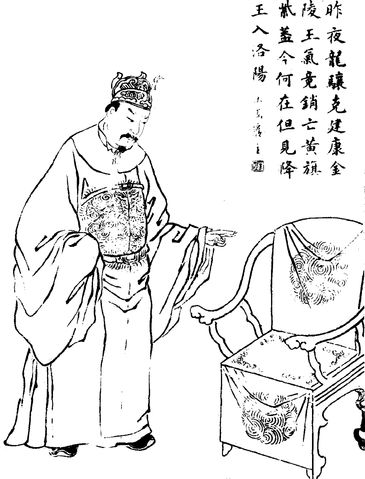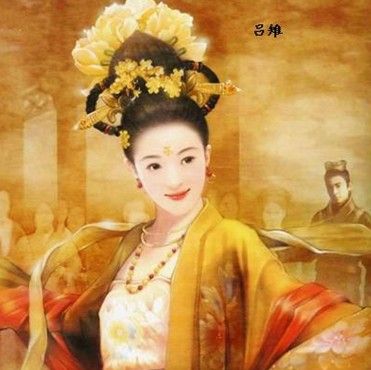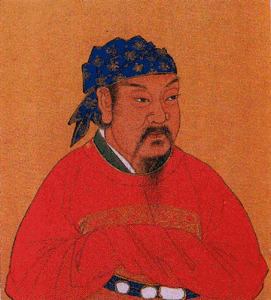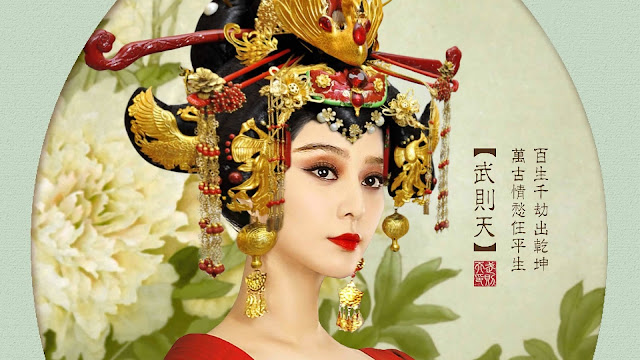Top 10 Insane Rulers in Ancient China
Long before the rest of the world, ancient China mastered papermaking, printing, navigation, and the complex administrative challenge of governing such a vast territory. Arguably, the Middle Kingdom has epitomized order and stability for millennia. So it doesn’t immediately spring to mind as a land of nutty barbarians and lunatic kings.
Here are some of the insane rulers in Chinese history:
Fu Sheng
Fu Sheng was not a lot an emperor as a petty king of the chaotic Sixteen Kingdoms period, which lasted from 304-439 AD. Right this moment, he’s remembered because the “one-eyed tyrant” for his vicious nature and conspicuously lacking eye, about which he was riddled with insecurities.
At the same time as a boy, Fu Sheng’s temperament was violently unpredictable. It’s truly how he misplaced an eye fixed within the first place. Apparently, his grandfather was teasing him someday about his one blind eye, asking him whether or not tears flowed solely from the opposite. Infuriated, Fu Sheng took out a dagger and stabbed himself within the blind eye to make it bleed – proof, he exclaimed, that he was capable of cry from each.
Throughout his two-year reign, he took out these insecurities on others. Anybody utilizing phrases denoting an absence of one thing, for instance – “lacking,” “much less,” “without,” and so forth – was instantly put to dying. He even killed his imperial doctor for prescribing him “somewhat” ginseng and angelica.
King Zhou of Shang
There’s an expression in China – jiuchí ròulín – that means excessive, sumptuous debauchery. Literally, it translates as “wine pool, meat forest” and is an equally literal reference to a favorite pastime of King Zhou.
Ruling over the final years of the Shang dynasty between 1075 and 1046 BC, King Zhou was known for his brutal acts of violence such as cutting out the heart of sage Bi Gan, just to see if it was bigger than anyone else’s. Above all, though, he’s remembered for his vast pool of wine and accompanying forest of meat that he had built in the palace grounds. Here, the king and his friends whiled away their time in canoes, scooping up wine with their hands and plucking freshly roast meat from the trees.
According to one story, Zhou’s men would pair off eunuchs and concubines to frolic naked around the pool, eating meat and drinking wine until sunset when the king got bored. At that point, a few of the pairs were selected for beating to an actual pulp before being carted off in a “pulp trough.”
In fact, Zhou’s life of debauchery was paid for by the long-suffering Chinese people, already burdened by heavy taxes and conscript labor. Eventually, their anger reached critical mass. During the conflict that ensued, even Zhou’s own troops and generals turned against him. Ultimately, he committed suicide by setting himself on fire.
For at least a few years after that, wine was restricted to religious purposes only and forbidden for recreational use.
Qin Shi Huang
Qin Shi Huang was the founder of the pioneering Qin dynasty, uniting China and becoming its first Emperor in 221 BC. Beyond that, his formidable legacy includes the precursor to the Great Wall of China, the thousands-strong Terracotta Army, and his (as yet unexplored) underground mausoleum, based in the capital of Xianyang. Needless to say, Qin Shi Huang was a man of raw ambition; it pumped through his veins and drove everything he did. Unfortunately, it was also his downfall.
His desire for immortality probably started innocently enough, but it became an all-consuming obsession in the end. According to the ancient historian Sima Qian, he often sent senior officials off on impossible searches for the “herbs of everlasting life.” And when he heard tales that an island of immortals lay out to sea, he sent thousands of children to investigate.
Ultimately, he wanted to become the “True Man” of Chinese mythology, one who had gained immortality. He even swallowed mercury on a regular basis in the belief that it boosted longevity.
Emperor Wenxuan of Northern Qi
Emperor Wenxuan, who reigned during the Northern Qi dynasty from 550 to 559 AD, was fond of removing his clothes at least when he wasn’t dressing up as a barbarian complete with brutish hairdo and colorful sashes.
According to the historian Sima Guang, he often got blind drunk and ran around in the nude even in the coldest winter. Sometimes singing and dancing from morning to night, he also enjoyed barging into the private residences of nobles and officials wearing nothing but theatrical makeup.
All this might seem harmless enough on the surface, but his drunken madness got pretty vicious at times. On one occasion, he asked a woman in the street what she thought of the emperor. When she replied that she thought he was crazy, and that he was unfit to rule, Wenxuan lopped off her head.
In fact, he killed people so frequently, and so indiscriminately, that whenever he got drunk his prime minister made sure to protect the innocent by having condemned prisoners available for him to slaughter instead.
Sun Hao
The reign of Sun Hao, the last Wu ruler of the Three Kingdoms Period (220-280 AD), actually started quite well. Not only did he relieve the hunger of the poor with supplies from government granaries, he also freed concubines from the palace to marry ordinary people. As his premiership wore on, however, he gained a reputation as a foul-tempered, bloodthirsty drunkard.
Those who refused to drink with him were put to death for the insult. At one particularly memorable banquet, he caught an imperial counselor pretending to be drunk when he wasn’t. Immediately, Sun Hao had the man beheaded and his head tossed from reveller to reveller around the table, ordering each one to tear flesh from the head with his teeth until only the skull remained.
Understandably, some of Sun Hao’s top officials, including prime minister Pu Yangxing and left general Zhang Bu, were critical of his ways. When Sun Hao found out, he had them both killed in exile, along with their entire families.
Toghon Temür
Toghon Temür was installed as the tenth emperor of the Yuan dynasty in 1333, aged just 13 years old. He is also remembered as the last emperor of the Mongol Empire. As the ruler of China until 1368, Temür lived through an especially turbulent time in the nation’s history. At the forefront of the crises facing the empire were waves of natural disasters, devastating the Grand Canal and much of the infrastructure along the Yellow River. The resultant flooding caused famine and displacement among the people, many of whom were required, through forced labor, to repair the damage.
But Temür spent much of his time distracted, having replaced his senior officials with priests and eunuchs. While the people suffered, he built a huge pleasure boat for sailing around the palace lake, designed an elaborate water clock that involved draining the palace moat (at great cost), and explored the mysteries of Tibetan tantra with his personal harem of concubines.
Like Kublai Khan, Temür was obsessed with magic and by the sex magic rites of Tibet in particular. Having surrounded himself with lamas and holy men, he established a palace deep within the Forbidden City in which he could practice far from the plight of his people. Here, the emperor and his inner circle engaged in orgies and esoteric dances and, according to one contemporary source, even underage royal princes and girls from the country took part.
Outside, resentment continued to grow and rebellions began to take shape. Toward the end of Temür’s rule, before his final retreat to the steppe things got so bad that even his own son planned to overthrow him.
Empress Lü Zhi
Empress Lü Zhi wasn’t technically a ruler in her own right. But her actions became unhinged as time went on that her son, the Emperor Hui of Han, went into shock and had a kind of nervous breakdown, leaving her to dominate government until her death in 180 BC.
Empress Lü was guilty of a great many evils during her lifetime. For instance, she helped Emperor Liu Bang consolidate his power by exterminating all nobles with names other than Liu and Lu. And she thought nothing of poisoning high-ranking officials. But the act that pushed her son over the edge was undoubtedly her worst by far. Threatened by the status and beauty of the concubine Lady Qi, Lü had her son Ru Yi killed with poison and subjected her rival to torture. More specifically, she had Lady Qi’s limbs amputated, eyes gouged out, ears burned, and vocal cords destroyed with acid. Still alive, the deaf, blind, mute, and limbless Lady Qi was thrown into a pigsty and mocked as “the human-shaped pig.” Lü summoned Hui to see what she had done and understandably he never recovered. He died at the age of 22 in 188 BC, eight years before his mother at 61.
Qianfei of Liu Song
Emperor Qianfei (449-465 AD), or as he’s more ignobly remembered, the Former Deposed Emperor of Liu Song, ascended the throne as a teenager. And, like any teenager might, he repealed all of his father’s laws at once.
During his short but violent reign, which lasted little more than a year, Qianfei murdered numerous members of his family and caged a number of his uncles. Constantly paranoid about being overthrown, he killed anyone even suspected of plotting against him, which in his case was most of the court. When he found out that some of his highest-ranking officials were conspiring against him for real, he not only killed them but butchered their sons as well. He also killed his granduncle Liu Yigong for conspiracy. Afterward, he gouged out his eyes and stored them in honey, referring to them as “pickled ghost eyes.”
Among the other charges leveled against Qianfei are forcing his concubines to have sex with animals on pain of death and having incestuous affairs with his sister and aunt. When his aunt’s husband complained, Qianfei had him killed.
The Zhengde Emperor
The Zhengde Emperor ruled China in the Ming Dynasty between 1505 and 1521 AD. Unlike his father the Hongzhi Emperor widely regarded as an efficient and honorable ruler, historians aren’t quite sure what to make of Zhengde.
For one thing, he had no interest in government. Ascending the throne at 14, he spent much of his time pretending to be a shopkeeper in his own makes believe market, or else disguising himself as a commoner to visit the brothels of Beijing.
In fact, he hated spending time in the Forbidden City so much that he spent 240,000 ounces of silver on the construction of his so-called Leopard Quarter, a two-hundred room palace outside of the imperial grounds. Here, he dressed as a Mongol, listened to Central Asian music, dubbed himself the Great Generalissimo Zhu-Zhu, and otherwise shirked his duties. He also spent a great deal of time getting drunk with his friends and playing pranks on the neighbors. Sometimes, he and his friends would break into wealthy families’ households and kidnap their daughters for fun.
In the end, Zhengde’s party lifestyle burned itself out. Aged just 29, he died without leaving a successor. Although the precise cause of death is unknown, it may have had something to do with his drunken tumble from a fishing boat into freezing cold water.
Wu Zetian
Aside from being the only Empress to rule over China alone - effectively as emperor from 690 to 705 AD, with her own harem of male concubines - little is known about Wu Zetian. There are plenty of stories, of course, but not much is known for sure.
Allegedly, she rose to power by smothering her own infant daughter and framing Empress Wang so she could marry the emperor herself. She’s then thought to have had Wang and the “Pure Concubine” drowned in wine after cutting off their hands and feet, exclaiming: “now these two witches can get drunk to their bones.” Next, she went on to poison her husband, one of the few Chinese emperors to die without family present.
For most of her life, Wu controlled state affairs from behind the scenes, manipulating a line of sons before finally seizing power for herself. When she did, she is said to have clung to it with an iron fist. Aided by a terrifying secret police force, whose methods included “piercing the hundred veins” and “begging for the slaughter of my entire family,” she destroyed fifteen family lines in just one year. Many of her rivals she summoned to the throne room to actually commit suicide in front of her. She also kept the company of two flamboyant eunuchs and promoted them to senior official positions, much to the irritation of the nobles.
In the end, however, she grew tired of it all. She freely gave up her title, forgave everyone who wronged her, and simply walked away from the throne to enjoy a peaceful retirement and death.



